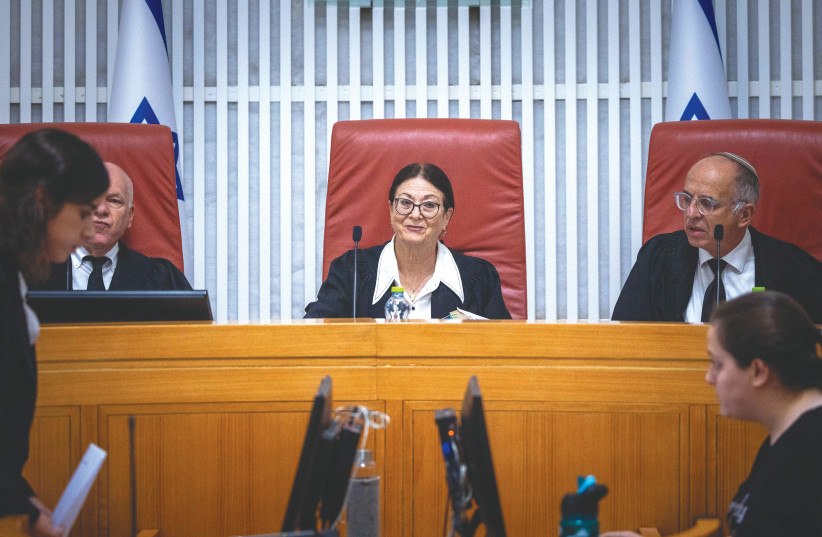The judge appointment panel that has been at the heart of the judicial reform debates, the Judicial Selection Committee, is set to have new Knesset representatives voted for on Wednesday.
On Monday, the list of the candidates for the two slots on the Judicial Selection Committee were finalized.
The nine candidates are Yesh Atid MK Karine Elharrar, Likud MK Avihai Boaron, Shas MK Uriel Busso, Likud MK Tally Gotliv, Likud MK Eli Dalal, Otzma Yehudit MK Limor Son Har-Melech, Likud MK Moshe Saada, Likud MK Moshe Passal, and Otzma Yehudit MK Yitzhak Kreuzer.
Traditionally, since the 1990s one of the Knesset representatives has been a member of the opposition, and the other a member of the ruling coalition. However in recent days, some coalition members have called for the coalition to take the second spot as well. Elharrar is the only opposition member on the list.
At least one of the candidates must be a woman, according to the official Knesset notice. Three of the nine candidates are women.

Voting for Judicial Selection Committee to begin on Wednesday at noon
The voting for the committee is set to begin in the Knesset plenum just before noon on Wednesday, and is expected to last three hours. Knesset speaker Amir Ohana will call MKs one-by-one alphabetically by their last names and submit a vote by secret ballot. The votes of four other committees are also being held concurrently.
The votes will be counted in the Knesset secretary's office by two members of the coalition and opposition each.
In addition to the two Knesset members, the composition of the nine-member judicial selection committee includes the High Court of Justice president, two other justices, two Bar Association attorneys, the justice minister and another cabinet minister.
The committee votes for High Court appointments with at least seven or two less than present in favor of the judge candidate. Lower court judges are approved by a simple majority vote.
Critics of the current formulation argue that the justices and Bar lawyers have a vested interest in cooperating with one another, since Bar members are becoming judges, and can create a majority block on the panel. They contend that the judges have effectively been able to self-select who joins their ranks without say of the electorate.
In January, Justice Minister Yariv Levin proposed a judicial reform formula which included vastly changing the composition and rules of the judicial selection committee. The proposal was written as the Judicial Selection Committee bill, which went through several iterations before being put before the Knesset plenum for second and third readings. The advancement of the bill was halted in late March at the direction of Prime Minister Benjamin Netanyahu due to mass protests against the reforms.
The final iteration of the bill would have increased the number of members to 11. Instead of two Knesset members, there would have been two MKs from the coalition, two from the opposition, and the Constitution, Law and Justice Committee chairman. The Bar representatives would be removed, and the justice minister would be joined by two cabinet ministers. The High Court president and other two justices would remain, but the justices would be replaced by magistrate and district court presidents for lower court appointments.
The voting would have been changed to a majority vote for High Court appointments, and at least seven for lower court appointments. To provide political balance, if there were three High Court appointments in a Knesset term, at least one opposition MK vote would be needed to approve the next candidate, and if four had been approved that term, the fifth would require an opposition MK and judge.
Judicial reform critics have argued that these changes would create an automatic majority for a ruling coalition to select judges and thereby politicize and remove the independence of the judiciary.
The committee has remained one of the most tenuous items in the judicial reform, and has continued to be on the red lines of the negotiating parties at the President's Residence. While both sides have expressed flexibility with other provisions, they have said that the selection committee is a lynchpin issue.
